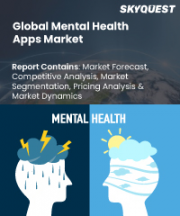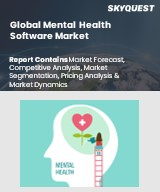
|
시장보고서
상품코드
1698123
정신건강 앱 시장 : 산업 규모, 점유율, 동향, 기회, 예측, 플랫폼 유형별, 용도 유형별, 지역별, 경쟁별(2020-2030년)Mental Health Apps Market - Global Industry Size, Share, Trends, Opportunity & Forecast, Segmented By Platform Type, By Application Type, By Region & Competition, 2020-2030F |
||||||
정신건강 앱 세계 시장 규모는 2024년 65억 5,000만 달러로 평가되었고, 2030년까지 15.55%의 연평균 복합 성장률(CAGR)을 보일 것으로 예측됩니다.
스마트폰이 사실상 우리 자신의 연장선상에 있는 것처럼 점점 더 디지털화되는 세상에서 기술이 정신 건강의 영역까지 진출한 것은 놀라운 일이 아닙니다. 정신건강 앱은 정신건강을 관리하려는 개인에게 지원, 자가 관리, 자원을 제공하는 강력한 도구로 등장했습니다. 이 앱들은 다양한 정신 건강 문제를 해결하기 위해 조정된 다양한 기능을 제공합니다. 불안과 우울증에서 스트레스와 수면장애에 이르기까지 정신 건강의 거의 모든 측면을 다루는 앱이 있습니다. 일반적으로 가이드 명상 세션, 기분 추적, 인지 행동 치료 운동, 가상 지원 그룹 등이 있습니다. 정신 건강 앱을 돋보이게 하는 것은 접근의 용이성입니다. 사용자는 언제든 편안한 프라이버시 공간에서 이러한 리소스에 참여할 수 있습니다. 정신 건강 앱의 매력은 개인화된 지원을 제공하는 능력에 있습니다. 데이터를 수집함으로써 이러한 앱은 사용자의 진행 상황을 추적하고 그에 따라 권장 사항을 조정할 수 있습니다. 이러한 데이터 기반 접근 방식은 보다 맞춤화되고 효과적인 경험을 가능하게 하며, 사용자는 특정 요구에 맞는 컨텐츠와 전략을 제공받을 수 있습니다. 또한, 정신건강 앱은 정신건강에 대한 대화를 정상화하는 데 중요한 역할을 하고 있습니다. 이러한 앱은 자기 인식과 감정 조절을 촉진하는 도구를 제공함으로써 사용자가 정신 건강의 여정에서 적극적인 역할을 할 수 있도록 돕고 있습니다. 또한, 기존 치료법을 보완하는 역할을 하며, 사용자는 세션 사이에 학습과 연습을 강화할 수 있습니다. 그러나 정신 건강 앱은 비판적인 시각으로 접근하는 것이 필수적입니다.
| 시장 개요 | |
|---|---|
| 예측 기간 | 2026-2030년 |
| 시장 규모 : 2024년 | 65억 5,000만 달러 |
| 시장 규모 : 2030년 | 156억 2,000만 달러 |
| CAGR : 2025-2030년 | 15.55% |
| 급성장 부문 | iOS |
| 최대 시장 | 북미 |
시장 성장 촉진요인
정신질환 유병률 증가
주요 시장 이슈
데이터 프라이버시 및 보안
주요 시장 동향
원격 치료의 통합
목차
제1장 개요
제2장 조사 방법
제3장 주요 요약
제4장 고객의 소리
제5장 세계의 정신건강 앱 시장 전망
- 시장 규모와 예측
- 금액별
- 시장 점유율과 예측
- 플랫폼 유형별(Android, iOS, 기타)
- 용도 유형별(우울증 및 불안 관리, 명상 관리, 스트레스 관리, 건강 관리, 기타)
- 기업별(2024년)
- 지역별
- 시장 맵
제6장 북미의 정신건강 앱 시장 전망
- 시장 규모와 예측
- 시장 점유율과 예측
- 북미 : 국가별 분석
- 미국
- 멕시코
- 캐나다
제7장 유럽의 정신건강 앱 시장 전망
- 시장 규모와 예측
- 시장 점유율과 예측
- 유럽 : 국가별 분석
- 프랑스
- 독일
- 영국
- 이탈리아
- 스페인
제8장 아시아태평양의 정신건강 앱 시장 전망
- 시장 규모와 예측
- 시장 점유율과 예측
- 아시아태평양 : 국가별 분석
- 중국
- 인도
- 한국
- 일본
- 호주
제9장 남미의 정신건강 앱 시장 전망
- 시장 규모와 예측
- 시장 점유율과 예측
- 남미 : 국가별 분석
- 브라질
- 아르헨티나
- 콜롬비아
제10장 중동 및 아프리카의 정신건강 앱 시장 전망
- 시장 규모와 예측
- 시장 점유율과 예측
- 중동 및 아프리카 : 국가별 분석
- 남아프리카공화국
- 사우디아라비아
- 아랍에미리트
제11장 시장 역학
- 성장 촉진요인
- 과제
제12장 시장 동향과 발전
- 최근 동향
- 제품 출시
- 인수합병(M&A)
제13장 PESTEL 분석
제14장 Porter의 Five Forces 분석
- 업계내 경쟁
- 신규 참여 가능성
- 공급업체의 힘
- 고객의 힘
- 대체품의 위협
제15장 경쟁 구도
- Mindscape Inc.
- Calm.com Inc.
- MoodMission Pty Ltd.
- Sanvello Health Inc.
- Headspace Inc.
- Flow Inc.
- Youper Inc.
- Silver Cloud Health Inc
- Happify Inc.
- Talkspace
제16장 전략적 제안
제17장 리서치사에 대해 & 면책사항
LSH 25.04.22Global Mental Health Apps Market was valued at USD 6.55 Billion in 2024 and is anticipated to project robust growth in the forecast period with a CAGR of 15.55% through 2030. In an increasingly digital world, where smartphones are practically extensions of ourselves, it comes as no surprise that technology has ventured into the realm of mental health. Mental health apps have emerged as a powerful tool to provide support, self-care, and resources to individuals seeking to manage their emotional well-being. These apps offer a range of features tailored to address various mental health concerns. From anxiety and depression to stress and sleep disorders, there's an app for nearly every aspect of mental wellness. They typically include guided meditation sessions, mood tracking, cognitive behavioral therapy exercises, and even virtual support groups. What sets mental health apps apart is their accessibility - users can engage with these resources at any time, in the comfort and privacy of their own space. The appeal of mental health apps lies in their ability to provide personalized assistance. Through the collection of data, these apps can track users' progress and adapt their recommendations accordingly. This data-driven approach allows for a more tailored and effective experience, ensuring that users receive content and strategies aligned with their specific needs. Furthermore, mental health apps have played a significant role in normalizing conversations around mental well-being. By offering tools that promote self-awareness and emotional regulation, these apps empower users to take an active role in their mental health journey. They also serve as complements to traditional therapy, allowing users to reinforce their learning and practice between sessions. However, it's essential to approach mental health apps with a critical perspective.
| Market Overview | |
|---|---|
| Forecast Period | 2026-2030 |
| Market Size 2024 | USD 6.55 Billion |
| Market Size 2030 | USD 15.62 Billion |
| CAGR 2025-2030 | 15.55% |
| Fastest Growing Segment | iOS |
| Largest Market | North America |
Key Market Drivers
Rising Prevalence of Mental Health Disorders
The increasing prevalence of mental health disorders is a primary driver of growth in the global mental health apps market. As of recent global estimates, one in every eight individuals, approximately 970 million people worldwide, are affected by mental health disorders, with anxiety and depression being the most prevalent conditions. The COVID-19 pandemic in 2020 triggered a substantial surge in these cases, with anxiety disorders increasing by 26% and major depressive disorders rising by 28% within a single year. This sharp escalation underscores the urgent need for scalable mental health interventions, driving demand for digital mental health solutions and therapeutic applications. As mental health issues such as depression, anxiety, stress, and other psychological conditions continue to rise, the demand for accessible, affordable, and effective mental health solutions has surged. The digitalization of mental healthcare, supported by mobile applications, has emerged as a crucial response to this growing crisis. Below are the key ways in which the rising prevalence of mental health disorders is fueling the expansion of the mental health apps market. The growing incidence of mental health disorders has led to a significant increase in individuals actively seeking support. Traditional mental health services, such as in-person therapy and psychiatric consultations, often come with challenges like high costs, long waiting times, and social stigma. Mental health apps address these issues by offering on-demand, self-guided support, making mental healthcare more accessible to a broader population.
Key Market Challenges
Data Privacy and Security
One of the most significant challenges in the mental health apps market is ensuring the privacy and security of user data. These apps often collect sensitive information, including emotional states, stress levels, and personal stories. To foster trust, developers must implement robust encryption and data protection measures to safeguard users' confidentiality. Striking a balance between personalization and data security is crucial. All user data, both in transit and at rest, should be encrypted to prevent unauthorized access. This includes information stored on servers and transmitted between the app and its servers. Apps should clearly explain the types of data collected, how it will be used, and who will have access to it. Users must provide informed consent before their data is collected.
Key Market Trends
Teletherapy Integration
Many mental health apps are integrating teletherapy options, allowing users to connect with licensed therapists via video or text. This trend bridges the gap between technology and professional care, offering users a comprehensive support system. For example, BetterHelp and Talkspace offer virtual therapy services as an integral part of their platforms.
Key Market Players
- Mindscape Inc.
- Calm.com Inc.
- MoodMission Pty Ltd.
- Sanvello Health Inc.
- Headspace Inc.
- Flow Inc.
- Youper Inc.
- Silver Cloud Health Inc
- Happify Inc.
- Talkspace
Report Scope:
In this report, the Global Mental Health Apps Market has been segmented into the following categories, in addition to the industry trends which have also been detailed below:
Mental Health Apps Market, By Platform Type:
- Android
- iOS
- Others
Mental Health Apps Market, By Application Type:
- Depression and Anxiety Management
- Meditation Management
- Stress Management
- Wellness management
- Others
Mental Health Apps Market , By Region:
- North America
- United States
- Canada
- Mexico
- Asia-Pacific
- China
- India
- South Korea
- Australia
- Japan
- Europe
- Germany
- France
- United Kingdom
- Spain
- Italy
- South America
- Brazil
- Argentina
- Colombia
- Middle East & Africa
- South Africa
- Saudi Arabia
- UAE
Competitive Landscape
Company Profiles: Detailed analysis of the major companies present in the Global Mental Health Apps Market.
Available Customizations:
Global Mental Health Apps Market report with the given market data, TechSci Research offers customizations according to a company's specific needs. The following customization options are available for the report:
Company Information
- Detailed analysis and profiling of additional market players (up to five).
Table of Contents
1. Product Overview
- 1.1. Market Definition
- 1.2. Scope of the Market
- 1.2.1. Markets Covered
- 1.2.2. Years Considered for Study
- 1.2.3. Key Market Segmentations
2. Research Methodology
- 2.1. Objective of the Study
- 2.2. Baseline Methodology
- 2.3. Key Industry Partners
- 2.4. Major Association and Secondary Sources
- 2.5. Forecasting Methodology
- 2.6. Data Triangulation & Validation
- 2.7. Assumptions and Limitations
3. Executive Summary
- 3.1. Overview of the Market
- 3.2. Overview of Key Market Segmentations
- 3.3. Overview of Key Market Players
- 3.4. Overview of Key Regions/Countries
- 3.5. Overview of Market Drivers, Challenges, Trends
4. Voice of Customer
5. Global Mental Health Apps Market Outlook
- 5.1. Market Size & Forecast
- 5.1.1. By Value
- 5.2. Market Share & Forecast
- 5.2.1. By Platform Type (Android, iOS, Others)
- 5.2.2. By Application Type (Depression and Anxiety Management, Meditation Management, Stress Management, Wellness management, Others)
- 5.2.3. By Company (2024)
- 5.2.4. By Region
- 5.3. Market Map
6. North America Mental Health Apps Market Outlook
- 6.1. Market Size & Forecast
- 6.1.1. By Value
- 6.2. Market Share & Forecast
- 6.2.1. By Platform Type
- 6.2.2. By Application Type
- 6.2.3. By Country
- 6.3. North America: Country Analysis
- 6.3.1. United States Mental Health Apps Market Outlook
- 6.3.1.1. Market Size & Forecast
- 6.3.1.1.1. By Value
- 6.3.1.2. Market Share & Forecast
- 6.3.1.2.1. By Platform Type
- 6.3.1.2.2. By Application Type
- 6.3.1.1. Market Size & Forecast
- 6.3.2. Mexico Mental Health Apps Market Outlook
- 6.3.2.1. Market Size & Forecast
- 6.3.2.1.1. By Value
- 6.3.2.2. Market Share & Forecast
- 6.3.2.2.1. By Platform Type
- 6.3.2.2.2. By Application Type
- 6.3.2.1. Market Size & Forecast
- 6.3.3. Canada Mental Health Apps Market Outlook
- 6.3.3.1. Market Size & Forecast
- 6.3.3.1.1. By Value
- 6.3.3.2. Market Share & Forecast
- 6.3.3.2.1. By Platform Type
- 6.3.3.2.2. By Application Type
- 6.3.3.1. Market Size & Forecast
- 6.3.1. United States Mental Health Apps Market Outlook
7. Europe Mental Health Apps Market Outlook
- 7.1. Market Size & Forecast
- 7.1.1. By Value & Volume
- 7.2. Market Share & Forecast
- 7.2.1. By Platform Type
- 7.2.2. By Application Type
- 7.2.3. By Country
- 7.3. Europe: Country Analysis
- 7.3.1. France Mental Health Apps Market Outlook
- 7.3.1.1. Market Size & Forecast
- 7.3.1.1.1. By Value
- 7.3.1.2. Market Share & Forecast
- 7.3.1.2.1. By Platform Type
- 7.3.1.2.2. By Application Type
- 7.3.1.1. Market Size & Forecast
- 7.3.2. Germany Mental Health Apps Market Outlook
- 7.3.2.1. Market Size & Forecast
- 7.3.2.1.1. By Value
- 7.3.2.2. Market Share & Forecast
- 7.3.2.2.1. By Platform Type
- 7.3.2.2.2. By Application Type
- 7.3.2.1. Market Size & Forecast
- 7.3.3. United Kingdom Mental Health Apps Market Outlook
- 7.3.3.1. Market Size & Forecast
- 7.3.3.1.1. By Value
- 7.3.3.2. Market Share & Forecast
- 7.3.3.2.1. By Platform Type
- 7.3.3.2.2. By Application Type
- 7.3.3.1. Market Size & Forecast
- 7.3.4. Italy Mental Health Apps Market Outlook
- 7.3.4.1. Market Size & Forecast
- 7.3.4.1.1. By Value
- 7.3.4.2. Market Share & Forecast
- 7.3.4.2.1. By Platform Type
- 7.3.4.2.2. By Application Type
- 7.3.4.1. Market Size & Forecast
- 7.3.5. Spain Mental Health Apps Market Outlook
- 7.3.5.1. Market Size & Forecast
- 7.3.5.1.1. By Value
- 7.3.5.2. Market Share & Forecast
- 7.3.5.2.1. By Platform Type
- 7.3.5.2.2. By Application Type
- 7.3.5.1. Market Size & Forecast
- 7.3.1. France Mental Health Apps Market Outlook
8. Asia-Pacific Mental Health Apps Market Outlook
- 8.1. Market Size & Forecast
- 8.1.1. By Value & Volume
- 8.2. Market Share & Forecast
- 8.2.1. By Platform Type
- 8.2.2. By Application Type
- 8.2.3. By Country
- 8.3. Asia-Pacific: Country Analysis
- 8.3.1. China Mental Health Apps Market Outlook
- 8.3.1.1. Market Size & Forecast
- 8.3.1.1.1. By Value
- 8.3.1.2. Market Share & Forecast
- 8.3.1.2.1. By Platform Type
- 8.3.1.2.2. By Application Type
- 8.3.1.1. Market Size & Forecast
- 8.3.2. India Mental Health Apps Market Outlook
- 8.3.2.1. Market Size & Forecast
- 8.3.2.1.1. By Value
- 8.3.2.2. Market Share & Forecast
- 8.3.2.2.1. By Platform Type
- 8.3.2.2.2. By Application Type
- 8.3.2.1. Market Size & Forecast
- 8.3.3. South Korea Mental Health Apps Market Outlook
- 8.3.3.1. Market Size & Forecast
- 8.3.3.1.1. By Value
- 8.3.3.2. Market Share & Forecast
- 8.3.3.2.1. By Platform Type
- 8.3.3.2.2. By Application Type
- 8.3.3.1. Market Size & Forecast
- 8.3.4. Japan Mental Health Apps Market Outlook
- 8.3.4.1. Market Size & Forecast
- 8.3.4.1.1. By Value
- 8.3.4.2. Market Share & Forecast
- 8.3.4.2.1. By Platform Type
- 8.3.4.2.2. By Application Type
- 8.3.4.1. Market Size & Forecast
- 8.3.5. Australia Mental Health Apps Market Outlook
- 8.3.5.1. Market Size & Forecast
- 8.3.5.1.1. By Value
- 8.3.5.2. Market Share & Forecast
- 8.3.5.2.1. By Platform Type
- 8.3.5.2.2. By Application Type
- 8.3.5.1. Market Size & Forecast
- 8.3.1. China Mental Health Apps Market Outlook
9. South America Mental Health Apps Market Outlook
- 9.1. Market Size & Forecast
- 9.1.1. By Value
- 9.2. Market Share & Forecast
- 9.2.1. By Platform Type
- 9.2.2. By Application Type
- 9.2.3. By Country
- 9.3. South America: Country Analysis
- 9.3.1. Brazil Mental Health Apps Market Outlook
- 9.3.1.1. Market Size & Forecast
- 9.3.1.1.1. By Value
- 9.3.1.2. Market Share & Forecast
- 9.3.1.2.1. By Platform Type
- 9.3.1.2.2. By Application Type
- 9.3.1.1. Market Size & Forecast
- 9.3.2. Argentina Mental Health Apps Market Outlook
- 9.3.2.1. Market Size & Forecast
- 9.3.2.1.1. By Value
- 9.3.2.2. Market Share & Forecast
- 9.3.2.2.1. By Platform Type
- 9.3.2.2.2. By Application Type
- 9.3.2.1. Market Size & Forecast
- 9.3.3. Colombia Mental Health Apps Market Outlook
- 9.3.3.1. Market Size & Forecast
- 9.3.3.1.1. By Value
- 9.3.3.2. Market Share & Forecast
- 9.3.3.2.1. By Platform Type
- 9.3.3.2.2. By Application Type
- 9.3.3.1. Market Size & Forecast
- 9.3.1. Brazil Mental Health Apps Market Outlook
10. Middle East and Africa Mental Health Apps Market Outlook
- 10.1. Market Size & Forecast
- 10.1.1. By Value
- 10.2. Market Share & Forecast
- 10.2.1. By Platform Type
- 10.2.2. By Application Type
- 10.2.3. By Country
- 10.3. MEA: Country Analysis
- 10.3.1. South Africa Mental Health Apps Market Outlook
- 10.3.1.1. Market Size & Forecast
- 10.3.1.1.1. By Value
- 10.3.1.2. Market Share & Forecast
- 10.3.1.2.1. By Platform Type
- 10.3.1.2.2. By Application Type
- 10.3.1.1. Market Size & Forecast
- 10.3.2. Saudi Arabia Mental Health Apps Market Outlook
- 10.3.2.1. Market Size & Forecast
- 10.3.2.1.1. By Value
- 10.3.2.2. Market Share & Forecast
- 10.3.2.2.1. By Platform Type
- 10.3.2.2.2. By Application Type
- 10.3.2.1. Market Size & Forecast
- 10.3.3. UAE Mental Health Apps Market Outlook
- 10.3.3.1. Market Size & Forecast
- 10.3.3.1.1. By Value
- 10.3.3.2. Market Share & Forecast
- 10.3.3.2.1. By Platform Type
- 10.3.3.2.2. By Application Type
- 10.3.3.1. Market Size & Forecast
- 10.3.1. South Africa Mental Health Apps Market Outlook
11. Market Dynamics
- 11.1. Drivers
- 11.2. Challenges
12. Market Trends & Developments
- 12.1. Recent Developments
- 12.2. Product Launches
- 12.3. Mergers & Acquisitions
13. PESTLE Analysis
14. Porter's Five Forces Analysis
- 14.1. Competition in the Industry
- 14.2. Potential of New Entrants
- 14.3. Power of Suppliers
- 14.4. Power of Customers
- 14.5. Threat of Substitute Product
15. Competitive Landscape
- 15.1. Mindscape Inc.
- 15.1.1. Business Overview
- 15.1.2. Product & Service Offerings
- 15.1.3. Recent Developments
- 15.1.4. Financials (If Listed)
- 15.1.5. Key Personnel
- 15.1.6. SWOT Analysis
- 15.2. Calm.com Inc.
- 15.3. MoodMission Pty Ltd.
- 15.4. Sanvello Health Inc.
- 15.5. Headspace Inc.
- 15.6. Flow Inc.
- 15.7. Youper Inc.
- 15.8. Silver Cloud Health Inc
- 15.9. Happify Inc.
- 15.10. Talkspace
16. Strategic Recommendations
17. About Us & Disclaimer
(주말 및 공휴일 제외)


















